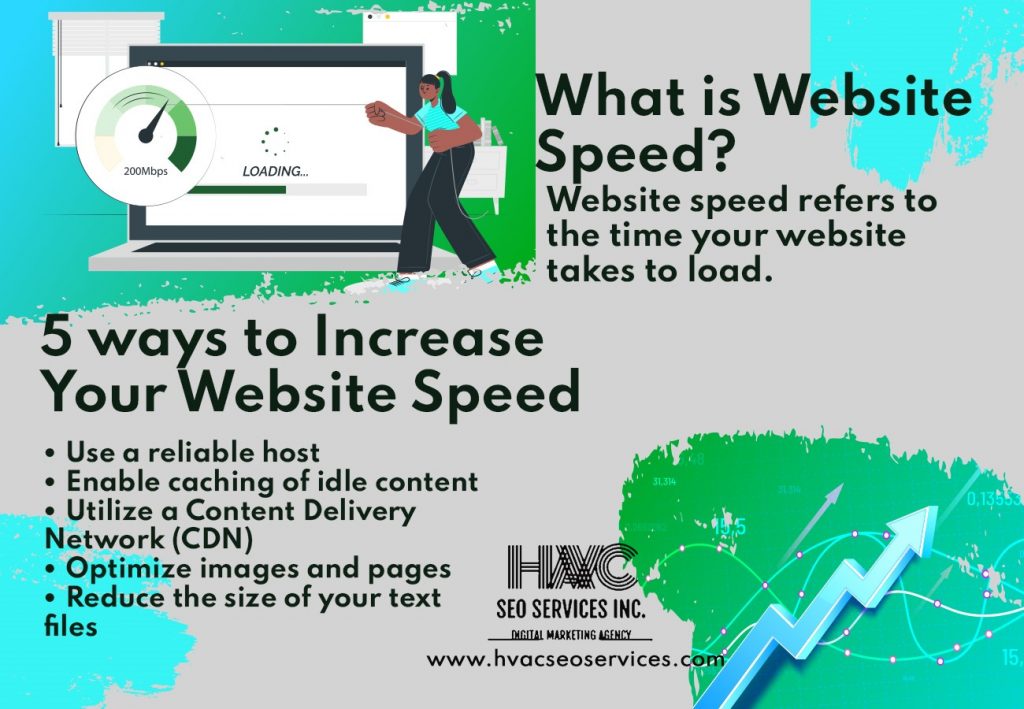
Are you concerned about your website speed? You are probably wondering if you need website speed optimization or simply to increase your website speed and if it matters if your site loads fast. Let us help you understand what website speed is and if the high website loading time is beneficial to your business.
What is Website Speed?
Website speed refers to the time your website takes to load. This begins when a searcher clicks on it to the time it is fully available. Website load speed is different from page speed. Page speed has to do with the loading time of individual pages and can affect the website’s loading pace.
Slow-loading websites frustrate searchers who are looking for quick information and solutions. This forms part of a bad user experience that discourages people from opening, navigating, and taking action on your website. Ultimately, this leads to a loss of potential customers and business opportunities.
The acceptable website speed is 3 seconds. This means that if your website does not open fully within 3 seconds of trying to access it, the visitors bounce back. Such visitors take their search to where the HVAC web design supports a speedy loading time, which could be your competitors’.
Why Is Website Speed optimization Important?
Website speed matters for your customers, your business, and the search engines. Here are some important reasons why website speed matters:
Enhanced Visibility
Web loading pace is among the factors that determine how Google ranks the website. Google seeks to give internet users a good user experience, web speed being one of them.
Because of this policy, it shields users from low-performing and unresponsive websites. Your website loading time should be fast whether the search comes from a desktop or a mobile device.
First Impression
Searchers interact with your website long before they know its content, meet you, or visit your office. If they are impressed with your website speed, they will take time to navigate it and sample its content. You therefore need website speed optimization to improve first impressions.
The opposite is also applicable in that any visitor who dislikes your website loading time will abandon the search.
While you may not achieve zero bounce rates, work to reduce it to a healthy percentage. A 21-40% bounce rate is okay and alarming if it reaches 70% and above.
User Experience
Today’s website users are quick scrollers, impatient, and busy. They expect websites to open at supersonic speed. If they don’t get it on your website, they quickly move to the next available option. Get your website speed right if you want to attract and retain users on your website.
Increased Traffic
Your website is the online branch of your business. It exists to generate leads and sales. You can accomplish this if the website speed is appealing, as your bounce-back rate will be minimal.
Here is how it works: if your website loading time is terrible, you lose potential conversions as they leave the site before seeing what you are offering. And if it loads promptly, you receive more traffic as the visitors will access the website within their expected loading time.
5 ways to Increase Your Site Speed
There are several ways you can do website speed optimization.
Use a Reliable Host
Your host should have reliable and solid hardware to support your site speed. Numerous hosts offer cost-effective hosting plans to suit small and established businesses.
Enable Caching
This allows some data to be stored in hidden storage and only availed when searchers request it. This increases site speed as only necessary data is lined up for display.
Utilize a Content Delivery Network (CDN)
A CDN stores your static files like CSS, JavaScript, videos, and images on a network of servers distributed on different geographical locations. When a search is initiated, the originating location is identified and the data availed from the nearest server so that the results can display in milliseconds.
This is especially helpful in reducing loading time and reducing video buffering time, which amounts to a better user experience for your visitors.
Optimize Images and Pages
Use graphic-editing tools to reduce the size of images without affecting their quality. Individual page search engine optimization for an HVAC website will ultimately impact your entire website loading time.
Use SEO for HVAC as one of your HVAC marketing strategies as it influences the number of conversions and sales you can generate.
Reduce the Size of Your Text Files to Optimize Website Speed
You can minify JavaScript and CSS to make them lighter. Your CDN may have plugins that automatically minify these text files. Check with your digital HVAC marketing services provider to know the best tools to scan and minify your text files.
For all your website optimization needs, talk to our website technical team. We are always ready to assist you with the best website speed optimization services.